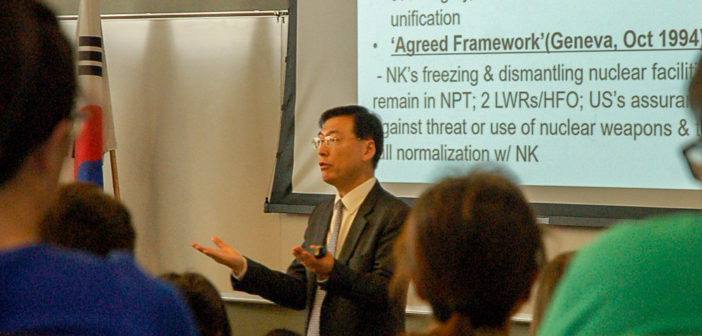Following his presentation, The Brown and White sat down with ambassador Choong-hee Hahn to talk about Lehigh, the United Nations sanctions and international negotiations. A recap of his presentation can be found here.
Q: How do you like Lehigh so far?
Choong-hee Hahn: Pennsylvania was my first destination and arrival point back in the ’80s when I joined the University of Pennsylvania to study, so Pennsylvania is something special for me. It’s very peaceful and also the first founding state of the new migrants in the United States, and I always feel very comfortable here. It’s very much like my hometown, but at the same time it’s very inspiring for me because of its historical importance to the United States. It’s something very special to me.
Q: You mentioned in your presentation the many different negotiations that have taken place among the nations involved in the conflict on the Korean peninsula. Recently, the foreign minister of China, Wang Yi, said China wanted to re-open negotiations for the missile and nuclear programs. What do you think has to be different about them for them to work or for North Korea to actually come to the table?
CH: Basically, there are several problems. First is that currently, North Korea is not interested in bringing back the six-party talks because they are continuously saying that development of nuclear weapons is inevitable against the hostile power of the United States.
So this hostile policy is why peace treaties should be resolved first between the United States and the Democratic People’s Republic of Korea before we talk about the nuclearization issue. The second problem is that even though we have these kind of six-party talks, without having definite knowledge of the nuclearization going on in North Korea.
This is just like an open-ended talk show. We cannot achieve any meaningful result of six-party talks. So currently, if North Korea is not present and the situation is not ready because North Korea is not ready to abandon nuclear weapons, they won’t give any conditions, ‘with this kind of condition we will abandon nuclear weapons.’
They are very adamant that they will stick to their nuclear weapons in any circumstances so there’s no point currently to have another six-party talk based on the original proposal of the six-party talks. In that context I think it’s meaningful but as China said, just reopening six-party talks again is not going to be meaningful at this stage.
Q: You had also mentioned in your talk about how important sanctions against North Korea are in hurting its missile and nuclear programs. There are some people who would say that sanctions are ineffective in this regard. What would you say to those people? Why do think they work and why do think they are important?
CH: We have been working with sanctions for less than a year, starting from March last year, and we started to activate them during the summer last year. To see some meaningful outcome, we have to take the time for implementation, and we have to wait another couple of years so that North Korea can feel tighter as a result of the implementation.
I think that it’s premature to say that the sanctions are not working or that the sanctions are meaningless. We have to have every country to implement the sanctions so that we are united in imposing them. I think there are some including coal, export and also many different areas like transportation, shipping, insurance, banking and financing.
If we really focus on those sanction layers, it has a really important impact. I heard from some North Korean refugees that arrived in South Korea recently, and they are saying that those sanctions are starting to work in North Korea.
This Q&A has been edited for length and clarity.






Comment policy
Comments posted to The Brown and White website are reviewed by a moderator before being approved. Incendiary speech or harassing language, including comments targeted at individuals, may be deemed unacceptable and not published. Spam and other soliciting will also be declined.
The Brown and White also reserves the right to not publish entirely anonymous comments.
1 Comment
Pingback: Q&A: South Korean UN ambassador Choong-hee Hahn – Matthew Cossel